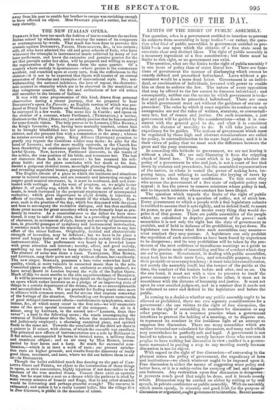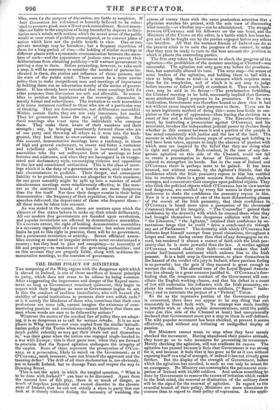TOPICS OF THE DAY.
LIMITS OF THE RIGHT OF PUBLIC ASSEMBLY.
TEE question, when is a government entitled to interfere to prevent its subjects from assembling in large bodies ?—or rather, the ques- tion what kind of public assemblies is government entitled to pro- hibit ?—is one upon which the citizens of a free state need to entertain clear and distinct ideas. The right of public assembly is a necessary ingredient of a free constitution ; but there must be limits to this right, or no government can exist. The question, what are the limits to the right of public assembly ? is one more of policy than of strict literal law. There are func- tions of government the manner of discharging which cannot be exactly defined and prescribed beforehand. Laws without a go- vernment would be a mere dead letter. Government is an indivi- dual, or combination of individuals, invested with power to enable him or them to enforce the law. The nature of every opposition that may be offered to the law cannot be foreseen beforehand ; and consequently, neither can the means by which government is to de- feat and put it down be prescribed beforehand. There are cases in which government must act without the guidance of statute or precedent. The rules by which it must regulate its conduct on such emergencies are not the rules of written, statutory, or consuetudi- nary law, but of reason and justice. On such occasions, a just government will be guided by the considerations—what it is con- sistent with the general good to do, and what it is consistent with the dictates of morality to do. It will take justice and expediency for its guides. The actions of government which must be regulated by those high and abstract considerations are called its policy, in contradistinction to its mere legal action; and it is in their views of policy that we must seek the difference between the great and the puny statesman.
In conceding this latitude to government, we are not leaving it without a check. We are only liberating it from the crippling check of literal law. The court which is to judge whether the policy of a government be wise and just, is not a court of law tied down by statutes and precedents, but the assembled representatives of the nation, in whom is vested the power of making laws, im- posing taxes, and refusing to authorize the levying of taxes by ministers in whom they want confidence. To this court they who accuse the government of a free state of culpable policy may appeal : it has the power to remove ministers whose policy is bad, and to impeach ministers whose conduct has been illegal.
The question which regards the limits of the right of public assembly, we have said, is a question of policy, not of strict law. Every government to which a people with a free legislature submits is entitled to assume that it acts rightly, and to defend itself, to assert its power, to put down by just means every thing that would de- prive it of that power. There are public assemblies of the people which are calculated to deprive government of its power : such assemblies it is not only the right but the duty of government to prohibit, and if held in defiance of its prohibition, to put down. No legislature can foresee what form such assemblies may assume—. what conduct they may pursue. A legislature can only prohibit the repetition of such assemblies as have been found by experience to he dangerous ; and its very prohibition will be taken by the pro- moters of the next seditious or tumultuous meetings as a guide to show the precise mode of assembling and line of conduct which they are not to pursue. Government, in dealing with public assemblies, must look less to their mere form, and ostensible purpose, than to their probable or necessary tendency: it must take into consideration, not merely the assembly itself, but the temper of the public at the time, the conduct of the leaders before and after, and so on. On the one hand, it must act with a view to preserve to itself the power necessary to enforce the law : on the other, it must act in accordance with the dictates of humanity and justice. It must act upon its own unaided judgment, and in a manner that it needs not be ashamed to avow and defend in the legislature and before the public.
In coming to a decision whether any public assembly ought to be allowed or prohibited, there are two separate considerations for a government : the one relates to the right of free discussion, the other to the right of assembliug in numbers for discussion or any other purpose. It is a common practice when a government interferes to prevent the holdite, of a meeting, or to disperse one, to represent its conduct in the invidious light of an attempt to suppress free discussion. There are many assemblies which are neither intended nor calculated for discussion, and many such which may nevertheless be perfectly safe and legal. A government is not bound to tolerate a meeting merely because those who convene it profess to have nothing but discussion in view ; neither is a govern- ment warranted in putting a stop to any meeting merely because discussion is not its object. With regard to the right of free discussion—of canvassing in the plainest terms the policy of government, the expediency of law; and institutions—no check whatever ought to be imposed upon it. Free discussion is either the means of suggesting wiser policy and better laws, or it is a safety-valve for carrying off bad and danger- ous humours. Any restriction upon free discussion is dangerous: it prevents much good that might be done, and it breeds moody rebels. Discussion may be carried on either by writing or by oral speech, in private conference or public assembly. With no assembly which meets openly, in sincerity and good faith for the purpose of discussion or argument, ought government to interfere. Secret assem.
blies, even for the purpose of discussion, are liable to suspicion. If their discussions are calculated or honestly believed to be calcu- lated to promote good, men will not seek concealment. Secret assem- blies are liable to the suspicion of being intended by degrees to fami- liarize men's minds with notions which the moral sense of the public would at once crush if publicly promulgated, or to concoct plans of action which have not the public benefit in view. One or two private meetings may be harmless ; but a frequent repetition of them for a long period of time—the holding of similar meetings at different places with a systematic communication between the mem- bers of each—and the appearance of jealous care to prevent their deliberations from obtaining publicity—will warrant government in putting a stop to them. Before proceeding, however, to take such a step, it will be necessary to consider the number of persons im- plicated in them, the station and influence of those persons, and the state of the public mind. There cannot be a more unwise policy than to make insignificant men and meetings of importance by holding them out as adversaries worthy of the notice of govern- ment. It has already been remarked that some tneetings held for other purposes than discussion are safe and allowable. In assem- blies to petition the legislature or the sovereign, discussion is merely formal and subordinate. The invitation to such assemblies is in many instances confined to those who are of a particular way of thinking. They are demonstrative, not deliberative assemblies. Within certain limits, they are not only innocuous, but useful. They let government know the state of public opinion. But these meetings also react upon the individuals who compose them. They make them aware of their numbers and their strength ; nay, by bringing prominently forward those who are of one party and throwing all others as it were into the back- ground, they lead them to over-estimate their strength. On this account, demonstrative meetings have a tendency, in times of high and general excitement, to create and foster a turbulent and rebellious spirit. This tendency is increased when such assemblies take the not unfrequent form of meetings to hear lectures and addresses, and when they are harangued in an exagge- rated and declamatory style, encouraging violence and opposition to the law and constituted authorities. This is the class of meet- ings which it is the duty of a government to watch, and under cer- tain circumstances to prohibit. Their danger, and consequent
liability to be prohibited, consists not altogether in their numbers ; for one great assembly might be split up into a number of small simultaneous meetings more mischievously effective, in like man-
ner as the scattered brands of a bonfire are more dangerous than the fire itself. Nor does their danger consist in their being demonstrative : the frequency of their repetition, the tenour of the speeches delivered, the deportmknt of those who frequent them— all these must be taken into account.
As was stated at the outset, these are matters upon which the citizens of free states behove to make up their minds deliberately. All our modern free governments are founded upon revolutions, and popular revolutions are effected by demonstrative assemblies. To a certain extent, the right of holding demonstrative assemblies is a necessary ingredient of a free constitution : but unless rational limits be put to this right in practice, there will be no government, but a permanent revolution or anarchy. Secret affiliated assem- blies meeting at stated or irregular intervals never revolutionized a country ; but they lead to plot and conspiracy—to insecurity of life and property—to weakness of the governing authorities ; and on this accbunt they are properly liable, along with seditious de- monstrative meetings, to the coercion of government.



























 Previous page
Previous page